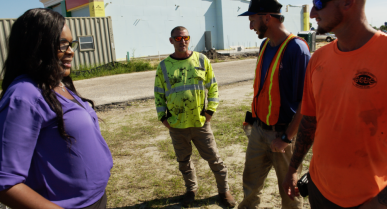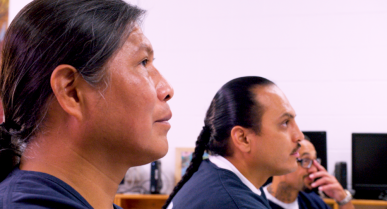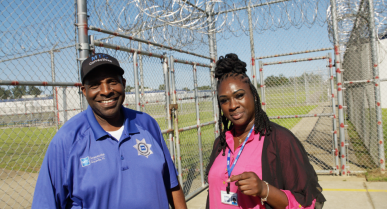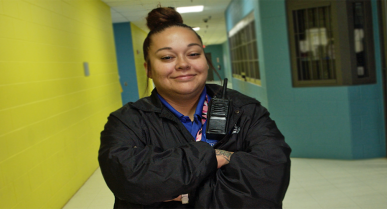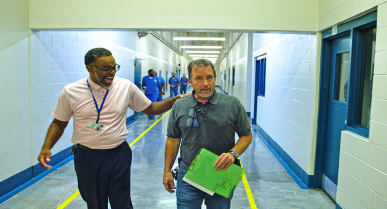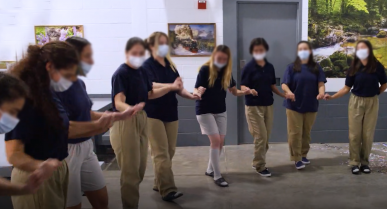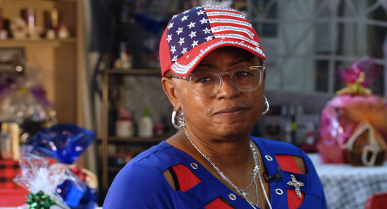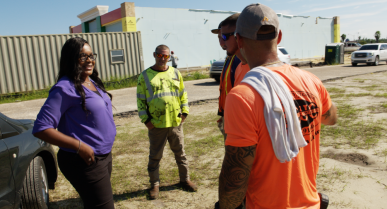A Program at Diboll is Therapy to Many Residents
Nick Carle and his wife Mandy are volunteers at MTC’s Diboll Correctional Center in Diboll, Texas. As a volunteer chaplain, Nick works with residents who are enrolled in Therapon, a criminal recovery and relapse prevention program. It’s a comprehensive, accredited course designed to train future ministers and counselors.
“Therapon Criminal Recovery & Relapse Program is a transformation,” says Blake Thornton, Diboll’s principal. “You have to make a change, an inner change, then start building from the bottom up.”
Therapon is a faith-based approach to building a foundation for lasting change in the lives of resident participants. It is affiliated with the Therapon Institute and is available at only two Texas prisons.
Besides teaching invaluable life skills, the program is designed to offer residents an associate’s degree, as well as a bachelor’s degree. However, with the shorter stays typical at the Diboll unit, those degrees are more than likely going to be accomplished after release. But the accredited hours offered at the facility are transferrable.
Pastor Carle explains, “When the men get out, they are able to either further advance in Therapon itself, or they can go to another college and they can transfer those credits to that college. And so anything they want to do, it’s kind of open to them.”
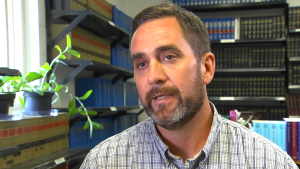 “A lot of these guys come into prison, I think they don’t have hope,” adds Principal Thornton. “And this class puts hope back in their life in looking forward to the future.”
“A lot of these guys come into prison, I think they don’t have hope,” adds Principal Thornton. “And this class puts hope back in their life in looking forward to the future.”
LeRoy Cruz is a resident who assists the Carles, helping facilitate Therapon.
“Life will not be easy,” says Cruz, “but when I make good decisions, life sure will not be as complicated as it was in the past. It’s all about decision making, and I believe Therapon helps us make those decisions; those better decisions.”
Nick is a graduate of the Therapon program himself. Incarcerated for 25 years, he was released from prison in 2003. He believes people want to change, but often don’t know how to make it happen.
“I found that was true with me; I really wanted to change, but I didn’t know how to. I remember where I came from. And I remember how important it was when all the volunteers that would give of themselves and their time to make an impact in people’s lives. And I told myself when I was in prison that if God ever gave me opportunity, I would come back in and give back. And so there’s nothing I would rather give myself to than Therapon and what we’re doing right now.”
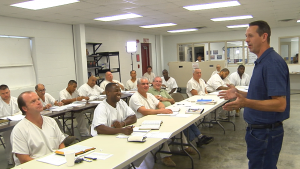 Nick’s wife Mandy adds her own impressions. “It’s an amazing feeling. You feel plugged in, and when you walk away from the prison, instead of feeling like you performed a job or had to do something, it’s like ‘wow, that was amazing.’ You feel good and ready to go and pumped up for the next time you come.”
Nick’s wife Mandy adds her own impressions. “It’s an amazing feeling. You feel plugged in, and when you walk away from the prison, instead of feeling like you performed a job or had to do something, it’s like ‘wow, that was amazing.’ You feel good and ready to go and pumped up for the next time you come.”
“And so we teach them to be not only better men of God,” Nick continues, “but better men in society. Better family men, better men who can raise families, and be role models to their daughters and their sons.”
“It’s great to see a program like Therapon,” concludes resident Cruz, “that can get guys from various beliefs, denominations; and whether they’re city boys or country boys. And yet we can all be a family here, and learn to put these different things we’ve taught; put them to the side, and let’s learn to focus on what it takes to be a better father, a better husband, a better son, and a better man.”
About Diboll Correctional Center
Diboll Correctional Center is accredited by the American Correctional Association—
achieving 100% compliance for both mandatory and non-mandatory standards in
its most recent audit. Other accreditations and certifications include the Correctional
Education Association and the Prison Rape Elimination Act (PREA).
